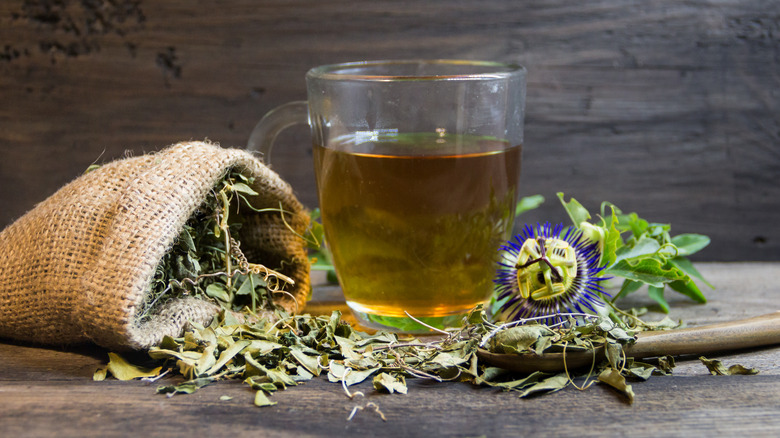Why You Should Absolutely Never Prepare Tisanes In An Aluminum Pot
It's common knowledge that you're not supposed to make tomato sauce in an aluminum pot, but the reasons extend beyond the metallic taste it can lend to your marinara. Turns out, this rule also applies to your favorite tisane as well. Aluminum is a reactive metal, meaning it loses electrons when it interacts with other substances. To prevent this, a thin protective layer is commonly added to aluminum cooking products. Aluminum that doesn't have an added film will develop its own natural aluminum oxide coating within 10 minutes of being at room temperature to prevent corrosion.
While this natural coat can prevent ion loss from water or the air, it's no match for anything even mildly acidic. When the metal comes in contact with the acid, it will release aluminum salts and gaseous hydrogen; not only can this impart a tinny taste to the food or liquid, but it can also be unsafe to consume.
Not all tisanes are highly acidic, but they can be depending on what's in them. Fruit-based varieties, such as raspberry leaf, peach, or blackberry, are considered highly acidic and will react with the metal. Often, tisanes are a combination of herbs (including acidic citrus accents), so it's best to avoid aluminum altogether when preparing one.
How dangerous is aluminum and what to use instead
According to the CDC, aluminum is typically not too much of a concern, but high levels of exposure to the metal can harm your health, and its effects on fertility in humans remains unknown. Research out of U.C. Irvine has linked low-level aluminum consumption to neurodegenerative diseases like Alzheimer's, but the CDC points out that this isn't altogether conclusive. Because aluminum is widely used in many applications we encounter on a day-to-day basis, it's best to mitigate your exposure to and ingestion of the metal, which can be found in things as common as antacids, baking powder, and food additives.
The acidic elements in your tisane, if used with an aluminum pot, will heighten (however marginally) your consumption of the metal. To avoid the potential aluminum leach in your herbal brew, opt for a stainless steel, glass, or ceramic pot to steep your leaves, spices, fruits, berries, and flowers of choice.

